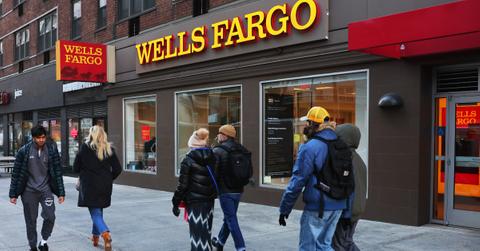Wells Fargo Agrees to $300M Settlement in Investor Lawsuit
Wells Fargo has agreed to a $300 million settlement in a class action lawsuit that accused the bank of forcing unnecessary auto insurance on customers.
Feb. 8 2023, Updated 2:55 p.m. ET

Although Wells Fargo denies it has done anything wrong, the company has agreed to a $300 million settlement in a class action lawsuit that accused the bank of forcing unnecessary auto insurance on customers.
"While we disagree with the allegations in this case, we are pleased to have resolved this legacy issue," a Wells Fargo spokesperson said in a statement, according to Reuters.

Who filed the lawsuit against Wells Fargo?
The lawsuit was filed by the Construction Laborers Pension Trust for Southern California on behalf of investors who claimed that Wells Fargo concealed the “force-placed” insurance practices and “artificially inflated” stock prices.
The push by Wells Fargo to sell customers collision insurance they didn’t need was exposed in a 2017 New York Times article. The Times article claimed that over 800,000 customers who received car loans from Wells Fargo were charged for “Collateral Protection Insurance,” which they didn’t need and, in some cases, couldn’t afford.
The expense of the unnecessary collision coverages forced about 274,000 Wells Fargo customers into delinquency, and almost 25,000 had their vehicles repossessed, the Times reported in 2017.
How did Wells Fargo’s conduct impact investors?
Although Wells Fargo ended the practice, the bank never disclosed the conduct to investors, even though Well Fargo filings with the SEC indicated that it had been aware of the problems since 2016.
“When companies conceal widespread abusive or unfair business practices that harm their customers, investors often get injured, as well,” said Scott H. Saham, a lawyer representing investors in the lawsuit against Wells Fargo.
Wells Fargo has been in trouble before.
Wells Fargo has had its fair share of legal troubles recently. In December, the Consumer Financial Protection Bureau (CFPB) ordered the bank to pay $3.7 billion in fines and customer restitution for its mismanagement of auto loans, mortgages, and deposit accounts.
In that case, Wells Fargo was accused of illegally assessing fees and interest charges on auto and mortgage loans and misapplying payments on loans. Because of the mismanagement, some customers lost their homes or vehicles. The CFPB also accused the bank of charging customers surprise overdraft fees to their checking and savings accounts.
In a third-quarter financial report filed with the SEC, Wells Fargo revealed that it was involved in a number of judicial, regulatory, governmental, arbitration, and other investigations concerning how it conducts business.
“...many of those proceedings and investigations expose Wells Fargo to potential financial loss or other adverse consequences,” the report states.
The CFPB says Wells Fargo is a “repeat offender” of unlawful business practices. Past penalties against the bank include:
$35.7 million in 2015 for an unlawful marketing-services-kickback scheme
$3.6 million fine in 2016 for illegal student loan servicing practices
$100 million fine in 2016 for "widespread" illegal practice of secretly opening unauthorized deposit and credit card accounts
$1 billion settlement in 2018 for unlawful auto-loan administration and mortgage practices
